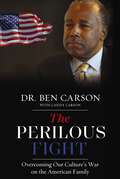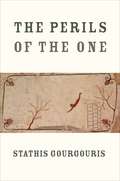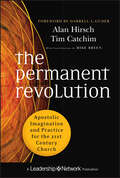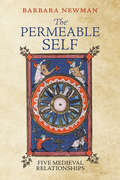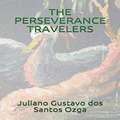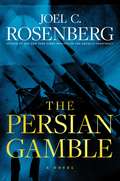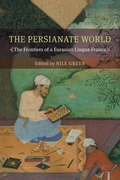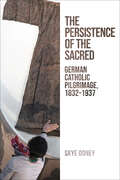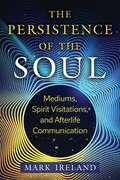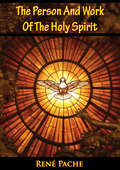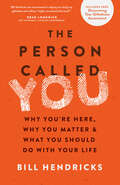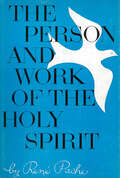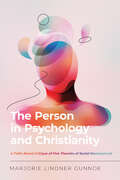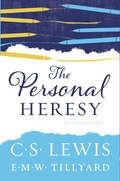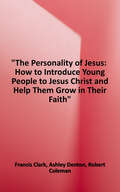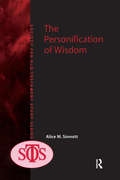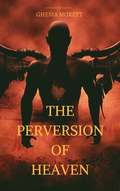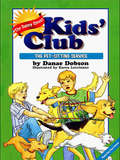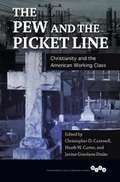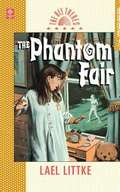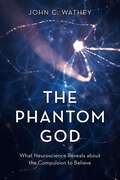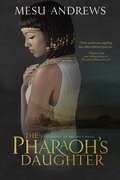- Table View
- List View
The Perilous Fight: Overcoming Our Culture's War on the American Family
by Ben Carson, M.D.Learn from one of our leading conservative voices how we can return to the biblical values our nation was founded upon, especially the vital importance of the family, in order to secure a prosperous future for generations to come.Does America no longer feel like home? Widespread divorce rates, the erosion of traditional marriage, the popular rise of radical ideologies, attacks on faith, and government interference are only a few of the factors contributing to the struggles of families in our culture. And because of the importance of healthy families to every part of our national life, the breakdown of the family threatens to rob us of the country we love. But it doesn't have to be this way.Like many of us, Dr. Ben Carson fears we are losing the country we love. In this provocative and ultimately hopeful book, he gives us the facts, inspiration, and theory-to-action answers we need to restore a key foundation of America: the family.The Perilous Fight equips us to understand:The hard data behind the breakdown of the family and its effects on our society, including poverty, crime, and deteriorating educationThe core biblical beliefs that led our nation into unprecedented freedom and prosperity--and why abandoning those beliefs led to the social decline we see todayThe fresh ideas and public policy options that could reverse negative trends impacting the family while maintaining a balance between constitutional freedoms and governmental involvement This is a practical and inspiring book for anyone who:Feels discouraged about the state of our country and its institutionsNeeds hope that there are commonsense, attainable solutions that we all can practiceAppreciates a conservative, Scripture-based approach to restoring faith, liberty, community, and life in America Strong families are the cornerstone of strong communities. Strong communities build a strong nation. Only when we prioritize the family as an institution established by God will we proudly remain the land of the free and the home of the brave.
The Perils of Love (Left Behind: The Kids #38)
by Tim Lahaye Jerry B. Jenkins Chris FabryBook 38. Judd and his friends face a new threat from the Global Community. Will God help them escape? Will they reach more people with their message? As a few members of the Young Tribulation Force move to Petra, deadly news reaches them about a beloved friend. While Lionel adjusts to a new assignment, Judd and Vicki must make decisions that will affect the rest of their lives. Join the Young Tribulation Force as they face the final clays before the battle of Armageddon.
The Perils of the One
by Stathis GourgourisFrom the earliest times, societies have been seduced by the temptation of unitary thinking. Recognizing the vulnerability of existence, people and cultures privilege regimes that confer authority on a single entity, a sovereign ruler, a transcendental deity, or an Event, which they embrace with unquestioned devotion. Such obsessions precipitate contempt for the worldliness of real bodies in real time and refusal of responsibility and agency.In The Perils of the One, Stathis Gourgouris offers a philosophical anthropology that confronts the legacy of “monarchical thinking”: the desire to subjugate oneself to unitary principles and structures, whether political, moral, theological, or secular. In wide-ranging essays that are at once poetic and polemical, intellectual and passionate, Gourgouris reads across politics and theology, literary and art criticism, psychoanalysis and feminism in a critique of both political theology and the metaphysics of secularism. He engages with a range of figures from the Apostle Paul and Trinitarian theologians, to La Boétie, Schmitt, and Freud, to contemporary thinkers such as Clastres, Said, Castoriadis, Žižek, Butler, and Irigaray. At once a broad perspective on human history and a detailed examination of our present moment, The Perils of the One offers glimpses of what a counterpolitics of autonomy would look like from anarchic subjectivities that refuse external ideals, resist the allure of command and obedience, and embrace otherness.
The Permanent Revolution
by Alan Hirsch Darrell L. Guder Tim Catchim Mike BreenA new brand of apostolic ministry for today's world The Permanent Revolution is a work of theological re-imagination and re-construction that draws from biblical studies, theology, organizational theory, leadership studies, and key social sciences. The book elaborates on the apostolic role rooted in the five-fold ministry from Ephesians 4 (apostles, prophets, evangelists, shepherds, and teacher), and its significance for the missional movement. It explores how the apostolic ministry facilitates ongoing renewal in the life of the church and focuses on leadership in relation to missional innovation and entrepreneurship.The authors examine the nature of organization as reframed through the lens of apostolic ministry.Shows how to view the world through a biblical perspective and continue the "permanent revolution" that Jesus startedOutlines the essential characteristics of apostolic movement and how to restructure the church and ministry to be more consistent with themAlan Hirsch is a leading voice in the missional movement of the Christian West This groundbreaking book integrates theology, sociology, and leadership to further define the apostolic movement.
The Permeable Self: Five Medieval Relationships (The Middle Ages Series)
by Barbara NewmanHow, Barbara Newman asks, did the myth of the separable heart take such a firm hold in the Middle Ages, from lovers exchanging hearts with one another to mystics exchanging hearts with Jesus? What special traits gave both saints and demoniacs their ability to read minds? Why were mothers who died in childbirth buried in unconsecrated ground? Each of these phenomena, as diverse as they are, offers evidence for a distinctive medieval idea of the person in sharp contrast to that of the modern "subject" of "individual."Starting from the premise that the medieval self was more permeable than its modern counterpart, Newman explores the ways in which the self's porous boundaries admitted openness to penetration by divine and demonic spirits and even by other human beings. She takes up the idea of "coinherence," a state familiarly expressed in the amorous and devotional formula "I in you and you in me," to consider the theory and practice of exchanging the self with others in five relational contexts of increasing intimacy. Moving from the outside in, her chapters deal with charismatic teachers and their students, mind-reading saints and their penitents, lovers trading hearts, pregnant mothers who metaphorically and literally carry their children within, and women and men in the throes of demonic obsession. In a provocative conclusion, she sketches some of the far-reaching consequences of this type of personhood by drawing on comparative work in cultural history, literary criticism, anthropology, psychology, and ethics.The Permeable Self offers medievalists new insight into the appeal and dangers of the erotics of pedagogy; the remarkable influence of courtly romance conventions on hagiography and mysticism; and the unexpected ways that pregnancy—often devalued in mothers—could be positively ascribed to men, virgins, and God. The half-forgotten but vital idea of coinherence is of relevance far beyond medieval studies, however, as Newman shows how it reverberates in such puzzling phenomena as telepathy, the experience of heart transplant recipients who develop relationships with their deceased donors, the phenomenon of psychoanalytic transference, even the continuities between ideas of demonic possession and contemporary understandings of obsessive-compulsive disorder.In The Permeable Self Barbara Newman once again confirms her status as one of our most brilliant and thought-provoking interpreters of the Middle Ages.
The Perseverance Travelers
by Juliano OzgaThe Birth Of The “Fire Salamander” (0-7 Years) The Turbulent Childhood Of Young Alf Naftali Kalil (8-14 Years) The Way To The Fire Work: Becoming a Manual Glass Master's Apprentice (15-21 Years) The Beginning Of Men's Trial And The Schooling Away From Home: Manual Glass Master (22-28 Years) The Practical Work Of Fire: The Marriage With Teresa Paula Isadora (29-35 Years) The Fire Salamander's Daughter: Augusta Rebeca Jade (36-42 Years) The Fight Against Adversity: Raising a Daughter (43-49 Years) The End Of The Hard Work To Survive (50-56 Years) The Beginning Of The Journey Of Perseverance Travelers (57-63 Years) The Water Initiation (64-70 Years) The Earth Initiation (71-77 Years) The Air Initiation (78-84 Years)
The Persian Gamble
by Joel C. RosenbergIn the follow-up to the New York Times bestselling Kremlin Conspiracy, Rosenberg’s latest international thriller tracks a terrifying nuclear alliance among three world powers―Russia, Iran, and North Korea―and the deadly mission former US Secret Service Agent Marcus Ryker must risk to halt their deadly strategy. Shot out of the air in enemy territory in the middle of the greatest international crisis since the end of the Cold War, former U.S. Secret Service agent Marcus Ryker finds himself facing an impossible task. Not only does he have to somehow elude detection and capture by Russian special forces, but he must convince his own government to grant safe harbor to the one man responsible for the global mayhem―Russian double agent and assassin Oleg Kraskin. While frantically negotiating with his contacts in the White House, Marcus learns that the unstable North Korean regime plans to use the international chaos as a smokescreen to sell nuclear weapons to Iran. With the fate of the entire free world on the line, Marcus makes a deal with the U.S. government―he will go back to work as an international operative and track down the WMDs before they end up in the hands of those with the determination and the means to use them. Marcus and Oleg worked together once before to avert a world war. Can they now find a way to stop world destruction?
The Persianate World: The Frontiers of a Eurasian Lingua Franca
by Nile GreenA free open access ebook is available upon publication. Learn more at www.luminosoa.org. Persian is one of the great lingua francas of world history. Yet despite its recognition as a shared language across the Islamic world and beyond, its scope, impact, and mechanisms remain underexplored. A world historical inquiry into pre-modern cosmopolitanism, The Persianate World traces the reach and limits of Persian as a Eurasian language in a comprehensive survey of its geographical, literary, and social frontiers. From Siberia to Southeast Asia, and between London and Beijing, this book shows how Persian gained, maintained, and finally surrendered its status to imperial and vernacular competitors. Fourteen essays trace Persian’s interactions with Bengali, Chinese, Turkic, Punjabi, and other languages to identify the forces that extended “Persographia,” the domain of written Persian. Spanning the ages of expansion and contraction, The Persianate World offers a critical survey of both the supports and constraints of one of history’s key languages of global exchange.
The Persistence of the Sacred: German Catholic Pilgrimage, 1832–1937 (German and European Studies)
by Skye DoneyFor millions of Catholic believers, pilgrimage has offered possible answers to the mysteries of sickness, life, and death. The Persistence of the Sacred explores the religious worldviews of Europeans who travelled to Trier and Aachen, two cities in Western Germany, to view the sacred relics in their cathedrals. The Persistence of the Sacred challenges the narrative of widespread secularization in Europe during the long nineteenth century and reveals that religious practices thrived well into the modern period. It shows both that men were more active in their faith than historians have realized and how clergy and pilgrims did not always agree about the meaning of relics. Drawing on private ephemeral and material sources including films, photographs, postcards, correspondence, and souvenirs, Skye Doney uncovers the enduring and diverse sacred worldview of German Catholics and argues that laity and clergy had very different perspectives on the meaning of pilgrimage. Recovering the history of Catholic pilgrimage, The Persistence of the Sacred aims to understand the relationship between relics and religiosity, between modernity and faith, and between humanity and God.
The Persistence of the Soul: Mediums, Spirit Visitations, and Afterlife Communication
by Mark IrelandCompelling evidence for afterlife messages backed by scientific research• Presents detailed accounts of experiments conducted to obtain evidence for the survival of consciousness after death, including the author&’s own test involving a secret message left behind by his late sister • Shares interviews with mediums to understand how they receive information from the spirit world and explains how to recognize fraudulent mediums • Explores the healing impact that afterlife communications can have on people who are grieving After the unexpected passing of his youngest son, Mark Ireland began a search for messages from the afterlife and discovered remarkable proof of life after death. Interweaving profound personal experience and compelling scientific evidence, Ireland presents a deep dive into psychic-medium phenomena, spirit visitations, after-life communication, reincarnation, synchronicity, and near-death experiences, pointing to the survival of consciousness after bodily death. He details how he confronted his resistance to engaging in the spiritual and parapsychological practices of his deceased father, prominent 20th-century psychic Dr. Richard Ireland, who counseled celebrities such as Mae West and the Eisenhower family. On his journey, he meets with respected mediums who deliver unexpected messages from his son, father, and others who have passed and explores the healing impact that such messages can have on people who are grieving. He shares his interviews with mediums to understand how they see, hear, and feel the information they receive from the spirits of the deceased, and he explains how to recognize fraudulent mediums. Ireland presents detailed accounts of scientific experiments conducted to obtain evidence for the continuity of consciousness, including the author&’s own test involving a secret message left behind by his deceased sister, Robin. The contents of this message were unknown to any living person and remained sealed in an envelope until the author received messages from a group of mediums. He exposes deceptive arguments made by skeptics and examines mediumship through the lens of multiple religious traditions—including some factions who seek to demonize the practice. Showing how spirit communication can be undeniably accurate and frustratingly ambiguous, Ireland reveals the profound healing and transformative possibilities available to those who come to believe in the persistence of the soul.
The Person And Work Of The Holy Spirit
by J. D. Emerson René Pache"The difference between a religion of mere letter and form and one of life and power lies in knowing the Holy Spirit."--Dr. R. A. TorreyCan you, or can any Christian go far in the Christian life without giving time and thought to the third Person of the Godhead? Obviously not, for the Holy Spirit takes the things of Christ and shows them to us, and makes the practical application of Bible knowledge obvious to us. He alone can transform Christian theory into life and deeds.Through this book, Dr. Pache will direct us into thinking again about who the Holy Spirit is, what He did before Pentecost, and what He has been doing since then in the lives of men. What place does the Holy Spirit have in the service of the Christian worker, and what will be His ministry in the future? THE PERSON AND WORK OF THE HOLY SPIRIT answers this question and others concerning conviction, baptism, filling, indwelling, and gifts of the Spirit.RENE PACHE was principal of Emmaus Bible School at Lausanne. He was the founder of the Inter-Varsity Christian Fellowship in Switzerland and France and gave much time to that organization. His published works include The Future Life and The Inspiration and Authority of Scripture.
The Person Called You: Why You're Here, Why You Matter & What You Should Do With Your Life
by Bill Hendricks&“I can&’t stand my job anymore.&” &“I feel like I have no direction. Like I&’m just marking time.&”&“What is my purpose?&”Do any of these thoughts sound familiar? In the last 70 years, social scientists and churches been trying to help people understand who they are and how they fit with personality tests and spiritual gifts tests – but these only go so far.Bill Hendricks goes beyond personality types to explore and explain the fullness of human giftedness and the concept of personhood. Using the &“Discover Your Design&” test, The Person Called You provides a specific, comprehensive, and accurate understanding of the phenomenon of human giftedness from a Biblical perspective. It moves past the limited scope of other gift discovery tests to look at each person&’s unique God-given designs and motivations. This book helps the reader understand their deep uniqueness as a human being and purpose in life from a variety of angles –work, marriage, parenting, education, and one&’s relationship with God.The Person Called You is for anyone who knows they aren&’t quite where they ought to be – and not quite where they will flourish best – and wants to who they were created to be. It&’s a presentation of hope – hope that there actually are answers to some of life&’s most perplexing questions.
The Person and Work of the Holy Spirit
by Rene Pache"The difference between a religion of mere letter and form and one of life and power lies in knowing the Holy Spirit."It was Dr. R. A. Torrey who pointed that out and showed Christians that the Holy Spirit is a Person to be worshiped, Someone who would take hold of you and use you as He transformed you from day to day.Can you, or can any Christian, go far in the Christian life without giving time and thought to the third Person of the Godhead? Obviously not, for the Holy Spirit takes the things of Christ and shows them to us, who makes the practical application of Bible knowledge in the outworking of Christian living. He alone can make Christian theory into life and deeds.Throughout this book, Dr. Pache will direct us into thinking again about who the Holy Spirit is, what He did before Pentecost, and what He has been doing since then in the lives of men. What place does the Holy Spirit have in the service of the Christian worker, and what will be His ministry in the future? The Person and Work of the Holy Spirit answers these questions and others concerning conviction, baptism, filling, indwelling, and gifts of the Spirit.
The Person and Work of the Holy Spirit
by Rene Pache"The difference between a religion of mere letter and form and one of life and power lies in knowing the Holy Spirit."It was Dr. R. A. Torrey who pointed that out and showed Christians that the Holy Spirit is a Person to be worshiped, Someone who would take hold of you and use you as He transformed you from day to day.Can you, or can any Christian, go far in the Christian life without giving time and thought to the third Person of the Godhead? Obviously not, for the Holy Spirit takes the things of Christ and shows them to us, who makes the practical application of Bible knowledge in the outworking of Christian living. He alone can make Christian theory into life and deeds.Throughout this book, Dr. Pache will direct us into thinking again about who the Holy Spirit is, what He did before Pentecost, and what He has been doing since then in the lives of men. What place does the Holy Spirit have in the service of the Christian worker, and what will be His ministry in the future? The Person and Work of the Holy Spirit answers these questions and others concerning conviction, baptism, filling, indwelling, and gifts of the Spirit.
The Person in Psychology and Christianity: A Faith-Based Critique of Five Theories of Social Development (Christian Association for Psychological Studies Books)
by Marjorie Lindner GunnoeIntegral to a Christian worldview and to psychology are foundational questions about personhood: What characteristics are essential? What is our purpose? Do we naturally incline toward good or bad? Are we accountable for self and responsible for others?The Person in Psychology and ChristianityErik EriksonJohn BowlbyB. F. SkinnerAlbert BanduraEvolutionary PsychologyFor each, Gunnoe includes a biography, a summary of the theorist's broad perspective on personhood, and an analysis of the theorist's stance on the four specific themes. This book is written for a general audience and suitable for undergraduate and graduate instruction.
The Personal Heresy: A Controversy
by C. S. Lewis E.M.W. TillyardA repackaged edition of the revered author’s set of dueling critical essays with fellow scholar E. M. W. Tillyard in which they debate the role of an author’s biography in the critical appraisal of literature.C. S. Lewis—the great British writer, scholar, lay theologian, broadcaster, Christian apologist, and bestselling author of Mere Christianity, The Screwtape Letters, The Great Divorce, The Chronicles of Narnia, and many other beloved classics—challenges fellow scholar E. M. W. Tillyard on one of the most intriguing questions involving writers and writing. Is a work of imaginative literature primarily influenced by the author or by the subject matter? Lewis argues that the author’s own personality and biography has little to no impact on the writing, while Tillyard contends the opposite: that the author’s own imagination and story have an indelible influence on a piece of work. Clever, erudite, and enlightening, their debate may not definitively settle the issue, but it does offer invaluable insight and intellectual delight for all dedicated readers.
The Personality of Jesus: How to Introduce Young People to Jesus Christ and Help Them Grow in Their Faith
by Ashley Denton Francis ClarkYoung people need someone who is crazy about them. – Walter Brueggemann “Originally authored by Francis Clark a hundred years ago, Ashley Denton has translated and overhauled the first writing, taking care to update and revise the text to make it more readable for a modern audience of young people. The book will be especially helpful to youth pastors, student ministry leaders and parents of young people.” –Robert E. Coleman (Author of Master Plan of Evangelism) “Francis Clark believed that Jesus was the embodiment of everything that young people longed for. The challenge of every generation is simply to give young people an accurate picture of Jesus Christ. Clark believed that if young people could just see the winsome personality of Christ, they would naturally be drawn to him like a magnet is to metal.” –Ashley Denton
The Personification of Wisdom (Society for Old Testament Study)
by Alice M. SinnottThis book examines the personification of Wisdom as a female figure - a central motif in Proverbs, Job, Sirach, Wisdom and Baruch. Alice M. Sinnott identifies how and why the complex character of Wisdom was introduced into the Israelite tradition, and created and developed by Israelite/Jewish wisdom teachers and writers. Arguing that by personifying Wisdom the authors of Proverbs responded to Israel's defeat by Babylon and the loss of Davidic monarchy, and by retrieving and transforming the Wisdom figure the authors of Sirach, Baruch and Wisdom responded to the spread of Hellenism and the potential loss of identity for Jews. Sinnott concludes that personified Wisdom functioned to reinterpret and transform the Israelite/Jewish tradition.
The Perversion Of Heaven (El Latido #1)
by Ghesia MorettBaronte is a demon that has perverted man for centuries. Adabel is an angel of love, empathy and piety. Nami is a Chinese girl, orphan and worker, who only has one Yucki, her Grandmother. Dassiel is the guardian angel of Nami and trusted brother of Adabel, who has not discover how much he is in love with his protege until it is too late. This character will cross their lives because of an impossible miracle: The heartbeat, the tremelus jump in the chest of the demon at stumble to Adabel in his fight for an innocent soul, being imprisoned by discovering his essence. The traps and games between heaven and hell, force these characters to live strange and dangerous situations, culminating in a deadly trap of hell, always using the hands of men. What is beyond all this? You will have to discover it by reading it. They will tell you in first person everything that it feel with their senses, everything that opens your feelings. A love that is above all human consideration, divine or diabolical
The Pet Sitting Service
by Danae DobsonThe Sunny Street Kids' Club books combine all the fun of being in a club with valuable lessons about responsibility, honesty, friendship, and being kind to others. So come on.be a Sunny Street Kid! It's a zoo when the Sunny Street Kids' Club comes up with a great idea for raising money--pet-sitting! But Connor and Ryan make all the plans without asking their parent's permission, and the result is disaster. This "hairy" experience teaches kids the importance of consulting parents.
The Pew and the Picket Line: Christianity and the American Working Class
by Christopher D. Cantwell Janine Giordano Drake Heath W. CarterThe Pew and the Picket Line collects works from a new generation of scholars working at the nexus where religious history and working-class history converge. Focusing on Christianity and its unique purchase in America, the contributors use in-depth local histories to illustrate how Americans male and female, rural and urban, and from a range of ethnic backgrounds dwelt in a space between the church and the shop floor. Their vivid essays show Pentecostal miners preaching prosperity while seeking miracles in the depths of the earth, while aboveground black sharecroppers and white Protestants establish credit unions to pursue a joint vision of cooperative capitalism. Innovative and essential, The Pew and the Picket Line reframes venerable debates as it maps the dynamic contours of a landscape sculpted by the powerful forces of Christianity and capitalism. Contributors: Christopher D. Cantwell, Heath W. Carter, Janine Giordano Drake, Ken Fones-Wolf, Erik Gellman, Alison Collis Greene, Brett Hendrickson, Dan McKanan, Matthew Pehl, Kerry L. Pimblott, Jarod Roll, Evelyn Sterne, and Arlene Sanchez Walsh.
The Phantom Fair (The Bee Theres #7)
by Lael LittkeYou’re going to love Beehives,” Bonnie’s older sister tells her, but Bonnie isn’t so sure. How are those perfect, pretty girls going to feel about bringing someone new into their group--especially a clumsy, no-talent, Bigfoot like her? To make matters worse, Bonnie accidentally volunteers to represent the Beehive class on the planning committee for the ward Halloween carnival, the Phantom Fair. Now she has to come up with the best idea ever; maybe that will show the other girls that she’s worthy to join the Bee Theres, their special club. When Nazli, Bonnie’s friend at school, offers to conjure up a mummy for the Beehives’ spook-alley room, things quickly get out of hand--particularly when the mummy shows up in Bonnie’s backyard! Join the Bee Theres for a fun and mysterious Halloween adventure! Summary: Bonnie, a twelve-year-old Mormon girl, hopes that her ideas for the ward Halloween party will get her into the popular girls’ club the Bee Theres, but the situation is complicated by a mummy in her backyard. Ages 8-13
The Phantom God: What Neuroscience Reveals about the Compulsion to Believe
by John C. WatheyDoes neuroscience have anything to say about religious belief or the existence of God? Some have tried to answer this question, but, in doing so, most have strayed from the scientific method. In The Phantom God, computational biologist and neuroscientist John C. Wathey, Ph.D., tackles this problem head-on, exploring religious feelings not as the direct perception by the brain of some supernatural realm, nor as the pathological misfiring of neurons, but as a natural consequence of how our brains are wired.Unlike other neurobiological studies of religion and spirituality, The Phantom God treats mysticism not as something uniquely human and possibly supernatural in origin, but as a completely natural phenomenon that has behavioral and evolutionary roots that can be traced far back into our vertebrate ancestry. Grounded in evolutionary and behavioral biology, this highly original and compelling book takes the reader on a journey through the neural circuitry of crying, innate knowledge, reinforcement learning, emotional bonding, embodiment, interpersonal perception, and the ineffable feeling of certainty that characterizes faith.Wathey argues that the feeling of God&’s presence is spawned by innate neural circuitry, similar to the mechanism that compels an infant to cry out for its mother. In an adult, this circuitry can be activated under conditions that mimic the extreme desperation and helplessness of infancy, generating the compelling illusion of the presence of a loving, powerful, and all-knowing savior. When seen from this perspective, the illusion also appears remarkably like one that has long been familiar to neurologists: the phantom limb of the amputee, spawned by the expectation of the patient&’s brain that the missing limb should still be there. Including a primer on the basic concepts and terminology of neuroscience, The Phantom God details the neural mechanisms behind the illusions and emotions of spiritual experience.,
The Pharaoh's Daughter: A Treasures of the Nile Novel (Treasures of the Nile #1)
by Mesu Andrews"Fear is the most fertile ground for faith." "You will be called Anippe, daughter of the Nile. Do you like it?" Without waiting for a reply, she pulls me into her squishy, round tummy for a hug. I'm trying not to cry. Pharaoh's daughters don't cry. When we make our way down the tiled hall, I try to stop at ummi Kiya's chamber. I know her spirit has flown yet I long for one more moment. Amenia pushes me past so I keep walking and don't look back. Like the waters of the Nile, I will flow. Anippe has grown up in the shadows of Egypt's good god Pharaoh, aware that Anubis, god of the afterlife, may take her or her siblings at any moment. She watched him snatch her mother and infant brother during childbirth, a moment which awakens in her a terrible dread of ever bearing a child. Now she is to be become the bride of Sebak, a kind but quick-tempered Captain of Pharaoh Tut's army. In order to provide Sebak the heir he deserves and yet protect herself from the underworld gods, Anippe must launch a series of deceptions, even involving the Hebrew midwives--women ordered by Tut to drown the sons of their own people in the Nile. When she finds a baby floating in a basket on the great river, Anippe believes Egypt's gods have answered her pleas, entrenching her more deeply in deception and placing her and her son Mehy, whom handmaiden Miriam calls Moses, in mortal danger. As bloodshed and savage politics shift the balance of power in Egypt, the gods reveal their fickle natures and Anippe wonders if her son, a boy of Hebrew blood, could one day become king. Or does the god of her Hebrew servants, the one they call El Shaddai, have a different plan--for them all?
